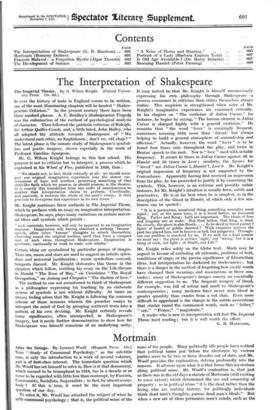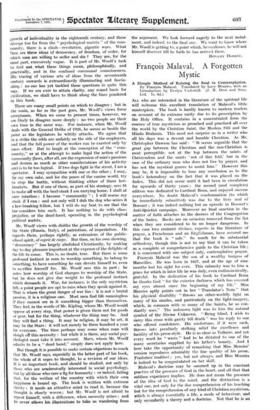Mortmain
After the Deluge. By Leonard Woolf. (Hogarth Press. 15s.) THIS " Study of Communal Psychology," as the sub-title runs, is only the introduction to a work of several volumes, and is of first-class interest. The immediate question which Mr. Woolf has set himself to solve is, How is it that democracy, which seemed to be triumphant in 1918, has in a decade or so come to be regarded with little less than contempt, by Fascists, Communists, Socialists, Imperialists ; in fact, by almost every- body ? If this is true, it must be the most important question of our day.
To solve it, Mr. Woolf has attacked the subject of what be calls communal psychology ; that is, the political sense of the
mass of the people. Many politically idle people have noticed that political issues put before the electorate by various parties seem to be two or three decades out of date, and Mr. Woolf provides the explanation, delving profoundly into the reasons. It all rests upon what it is that forms this mysterious thing, political sense. Mr. Woolf's contention is, that just as there was in the old days a statute of Mortmain (still existing to some extent) which determined the use and ownership of property ; so in political ideas " it is the dead rather than the living. who are making history, for politically individuals think dead men's 'thoughts, ..pursue dead men's ideals." But when a new set of ideas permeates men's minds, such as the growth of individuality in the eighteenth century, and these diverge too far from the " psychological matrix " of the com- munity, there is a clash—revolution, gigantic wars. What then are these ideas of democracy, of freedom, of order, for which men are willing to suffer and die ? They are, for the most part, excessively vague. It is part of Mr. Woolf's task to find out what these -things _mean, philosophically, and practically, and in the confused communal consciousness. His tracing of various sets of ideas from the seventeenth century onwards is extraordinarily illuminating and fascin- ating : no one has yet tackled these questions in quite this way. If we are ever to attain clarity, any sound basis for civilization, we shall have to think along the lines pondered in this book.
There are many small points on which to disagree ; but in the main, as far as the past goes, Mr. Woolf's views force acceptance. When we come to present times, however, we are likely to disagree more deeply : no two people see their own time in the same way. For instance, when Mr. Woolf deals with the General Strike of 1926, he seems as beside the point as the legislators he wittily attacks. We agree that in a strike the odds are unfairly on the side of the employers, and that the full power of the worker can be exerted only by mass effort. But to laugh at the conception of the " com- munity," or at the attempt to make legal the action of the community (laws, after all, are the expression of man's passions and desires as much as other manifestations of his activity are) is to be too logical. If two dogs fight in the street, I am a spectator. I may sympathise with one or the other ; I may, for my own sake, and for the peace of the canine world, try to stop the battle, without thinking either of them law- breakers. But if one of them, as part of his strategy, sees fit to make off with the beef-steak I am carrying home, I shall at once interfere : 1 become " community " ; I will rescue my steak if I can : and not only will I dub the dog who seizes it a law-breaking fellow, but I will do my best to see that the law considers him such. It has nothing to do with class- prejudice, or the dead-hand, operating in the psychological political matrix.
Mr. Woolf views with dislike the growth of the worship of the State (Russia, Italy), of patriotism, of imperialism. He regards them, perhaps rightly, as extensions of the public- school spirit, of esprit de corps. But then, on his own showing, "democracy" has largely abolished Christianity, by making day to day pleasure important at the expense of the delights of the life to come. This is, no doubt, true. But there is some profound instinct in man to worship something, to belong to something, to have something he can devote himself to, even to sacrifice himself for. Mr. Woolf sees this in part ; he notes hoW worship of God -changes to worship of the State, but he does not give due weight to the profound instinct which demands it. War, for instance, is the only mysticism left, a point people are apt to miss, when they speak against it. That is where the great danger of war lies : it is not n brutal passion, it is a religious one. Most men find life meaningless if they cannot see in it something bigger than themselves. They feel, in the words of Mr. Kipling, whom Mr. Woolf would oppose at every step, that power is given them not for goods or gear, but for the thing, whatever the thing may be. And they will find a thing. It may be religion, it may be art, it may be the State : it will not merely be three hundred a year for everyone. The time perhaps may come when man will slough off this necessity : but while it is there, any social psy- chologist must take it into account. Marx, whom Mr. Woolf admits to be a " dead hand," simply does -not apply here.
But though it is possible to make certain objections to much that Mr. Woolf says, especially in the latter part of his book, the whole of it urges to thought, to a revision of our ideas. It is an important book, and should be studied, not only by those who are academically interested in social psychology, but by all those who care a fig. for humanity : or indeed, failing that, for the welfare of the. country with which their own happiness is bound up. The book is written with extreme clarity : it needs an attentive mind to read it, because the thought is closely woven ; but Mr. Woolf is not afraid to repeat himself, with a difference, when necessity arises ; and he never allows his illustrations to take us wandering from the argument. We look forward eagerly to the next instal- ment, and indeed, to the final one. We want to know where Mr. WoolLis getting to, a point which, he confesses, he will not himself discover till he finds he has arrived there.
BONAMY DOB/if::.















































 Previous page
Previous page